
W78C54
8-BIT MICROCONTROLLER
Publication Release Date: December 1997
- 1 -
Revision A2
GENERAL DESCRIPTION
The W78C54 is a derivative of the W78C52 microcontroller family that provides extended internal
ROM. The chip has 16K bytes of mask ROM and 256 bytes of RAM.
This device provides an enhanced architecture that makes it more powerful and suitable for a variety
of applications for general control systems. It provides on-chip 16KB mask ROM to accommodate
large program codes, 256-bytes of non-volatile on-chip RAM, four 8-bit I/O ports, one 4-bit I/O port,
three 16-bit timer/counters, eight sources with two-level interrupt structures, and on-chip oscillator
clock circuits.
FEATURES
∑
DC to 40 MHz extensive operating frequency
∑
256-byte on-chip scratch pad RAM
∑
16K-byte on-chip mask ROM
∑
64K-byte address space for external Program Memory
∑
64K-byte address space for external Data Memory
∑
Three 16-bit timer/counters
∑
Four 8-bit bit-addressable I/O ports
∑
One extra 4-bit bit-addressable I/O port, additional INT2/ INT3
(Available on 44-pin PLCC/QFP package)
∑
Eight-source, two priority-level interrupts
∑
Low EMI emission mode
∑
Built-in programmable power-saving modes - Idle mode & Power-down mode
∑
Packages:
-
DIP 40: W78C54-16/24/40
-
PLCC 44: W78C54P-16/24/40
-
QFP 44: W78C54F-16/24/40
-
TQFP 44: W78C54M-16/24/40
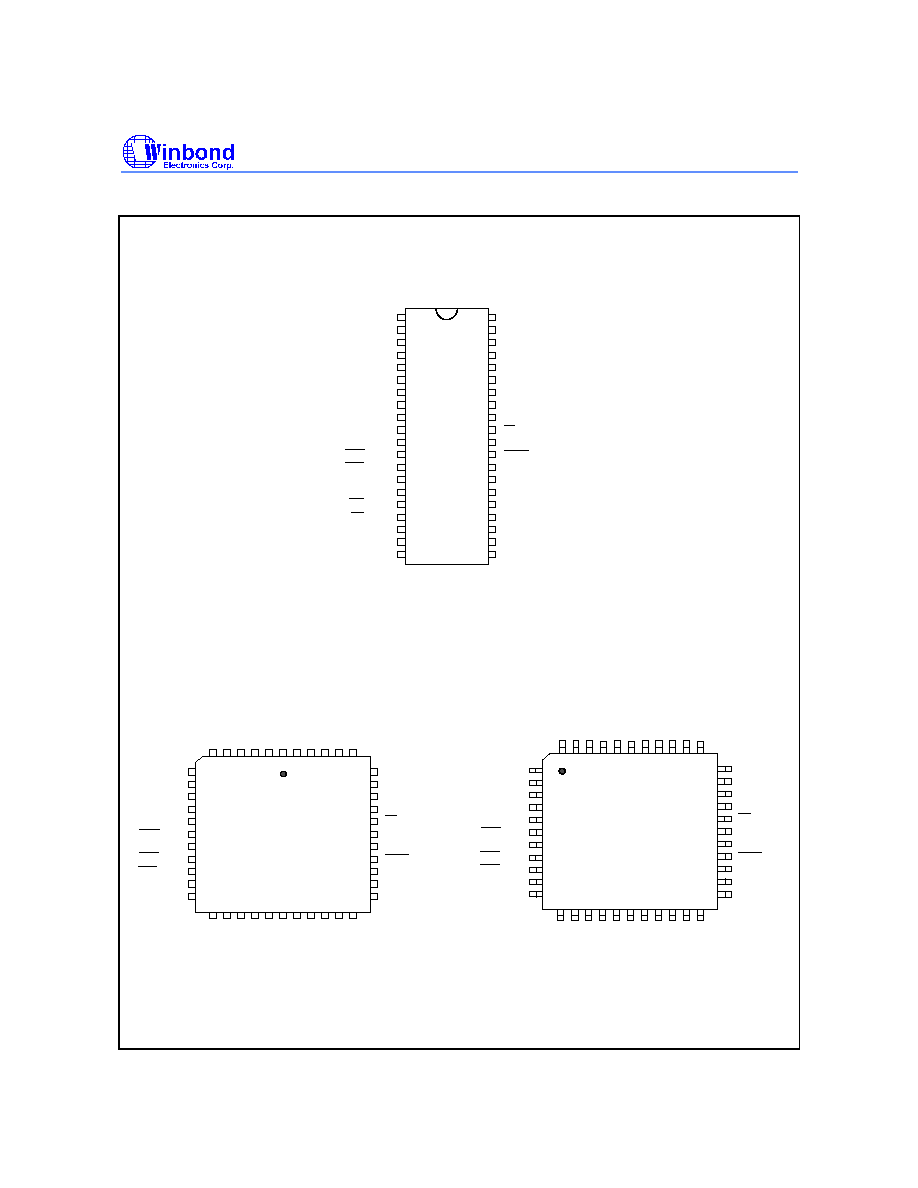
W78C54
- 2 -
PIN CONFIGURATIONS
VCC
1
2
3
4
5
6
7
8
9
10
11
12
13
14
15
16
17
18
19
20
39
40
34
35
36
37
38
30
31
32
33
26
27
28
29
21
22
23
24
25
P0.0, AD0
P0.1, AD1
P0.2, AD2
P0.3, AD3
P0.4, AD4
P0.5, AD5
P0.6, AD6
P0.7, AD7
EA
ALE
PSEN
P2.5, A13
P2.6, A14
P2.7, A15
P2.0, A8
P2.1, A9
P2.2, A10
P2.3, A11
P2.4, A12
T2, P1.0
40-Pin DIP (W78C54)
P1.2
P1.3
P1.4
P1.5
P1.6
RXD, P3.0
TXD, P3.1
P1.7
RST
INT0, P3.2
INT1, P3.3
T0, P3.4
T1, P3.5
WR, P3.6
RD, P3.7
XTAL1
XTAL2
VSS
T2EX, P1.1
44-Pin PLCC (W78C54P)
44-Pin QFP/TQFP (W78C54F/W78C54M)
34
40 39 38 37 36 35
44 43 42 41
33
32
31
30
29
28
27
26
25
24
23
P0.4, AD4
P0.5, AD5
P0.6, AD6
P0.7, AD7
EA
ALE
PSEN
P2.7, A15
P2.6, A14
P2.5, A13
22
21
20
19
18
17
16
15
14
13
12
11
4
3
2
1
8
7
6
5
10
9
P1.5
P1.6
P1.7
RST
RXD, P3.0
TXD, P3.1
INT0, P3.2
INT1, P3.3
T0, P3.4
T1, P3.5
X
T
A
L
1
V
S
S
P
2
.
4
,
A
1
2
P
2
.
3
,
A
1
1
P
2
.
2
,
A
1
0
P
2
.
1
,
A
9
P
2
.
0
,
A
8
X
T
A
L
2
P
3
.
7
,
/
R
D
P
3
.
6
,
/
W
R
A
D
3
,
P
0
.
3
T
2
,
P
1
.
0
P
1
.
2
V
C
C
A
D
2
,
P
0
.
2
A
D
1
,
P
0
.
1
A
D
0
,
P
0
.
0
T
2
E
X
,
P
1
.
1
P
1
.
3
P
1
.
4
40
2
1 44 43 42 41
6
5
4
3
39
38
37
36
35
34
33
32
31
30
29
P0.4, AD4
P0.5, AD5
P0.6, AD6
P0.7, AD7
EA
ALE
PSEN
P2.7, A15
P2.6, A14
P2.5, A13
28
27
26
25
24
23
22
21
20
19
18
17
10
9
8
7
14
13
12
11
16
15
P1.5
P1.6
P1.7
RST
RXD, P3.
TXD, P3.1
INT0, P3.2
INT1, P3.3
T0, P3.4
T1, P3.5
A
D
3
,
P
0
.
3
T
2
,
P
1
.
0
P
1
.
2
V
C
C
A
D
2
,
P
0
.
2
A
D
1
,
P
0
.
1
A
D
0
,
P
0
.
0
T
2
E
X
,
P
1
.
1
P
1
.
3
P
1
.
4
X
T
A
L
1
V
S
S
P
2
.
4
,
A
1
2
P
2
.
3
,
A
1
1
P
2
.
2
,
A
1
0
P
2
.
1
,
A
9
P
2
.
0
,
A
8
X
T
A
L
2
P
3
.
7
,
/
R
D
P
3
.
6
,
/
W
R
P
4
.
0
/
I
N
T
3
,
P
4
.
2
P4.1
P4.1
P
4
.
0
INT2, P4.3
INT2, P4.3
/
I
N
T
3
,
P
4
.
2
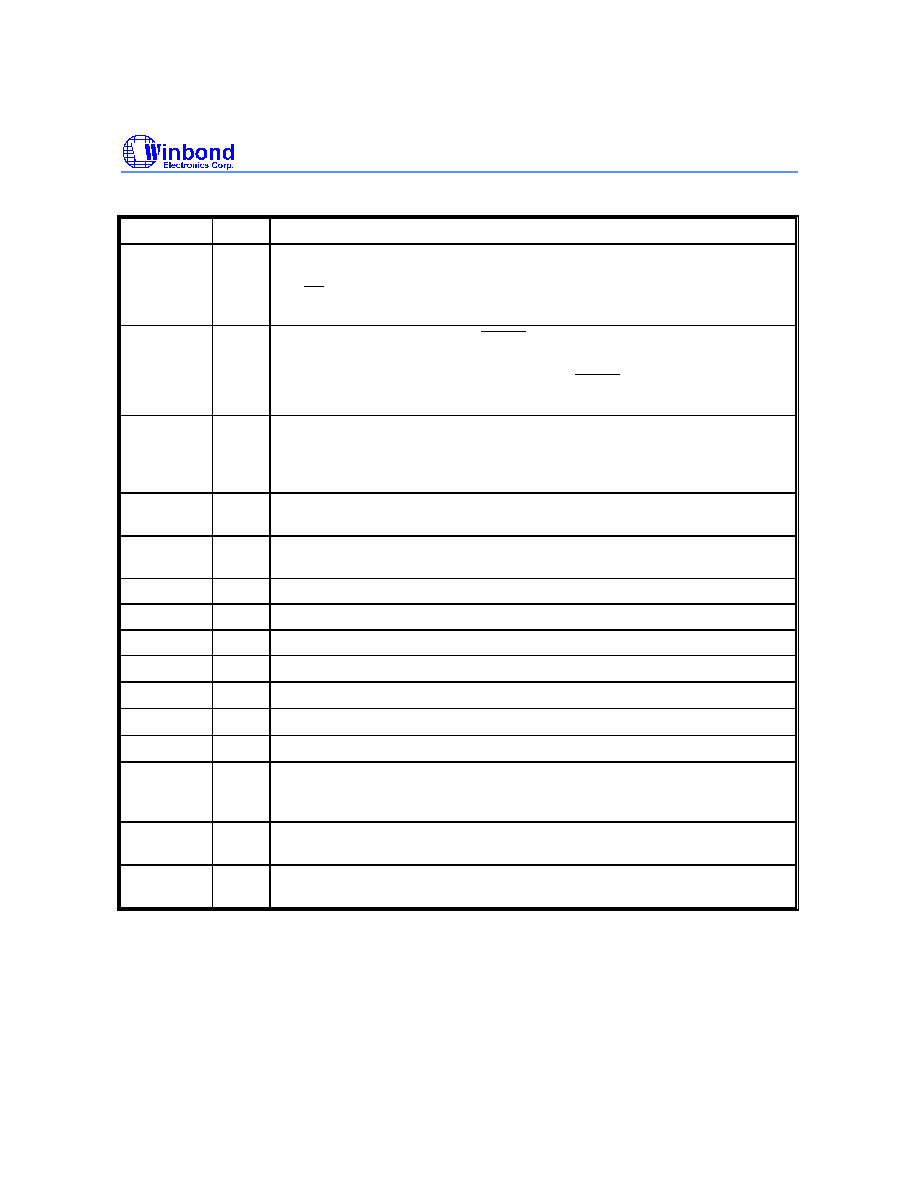
W78C54
Publication Release Date: December 1997
- 3 -
Revision A2
PIN DESCRIPTION
SYMBOL
TYPE
DESCRIPTIONS
EA
I
EXTERNAL ACCESS ENABLE: This pin forces the processor to execute out
of external ROM. The ROM address and data will not be present on the bus if
the
EA
pin is high and the program counter is within the 16 KB area.
Otherwise they will be present on the bus.
PSEN
O H
PROGRAM STORE ENABLE: PSEN enables the external ROM data in the
Port 0 address/data bus.
When internal ROM access is performed, no PSEN strobe signal outputs
originate from this pin.
ALE
O H
ADDRESS LATCH ENABLE: ALE is used to enable the address latch that
separates the address from the data on Port 0. ALE runs at 1/6th of the
oscillator frequency. An ALE pulse is omitted during external data memory
accesses.
RST
I L
RESET: A high on this pin for two machine cycles while the oscillator is
running resets the device.
XTAL1
I
CRYSTAL 1: This is the crystal oscillator input. This pin may be driven by an
external clock.
XTAL2
O
CRYSTAL 2: This is the crystal oscillator output. It is the inversion of XTAL1.
V
SS
I
GROUND: ground potential.
V
DD
I
POWER SUPPLY: Supply voltage for operation.
P0.0
-
P0.7
I/O D
PORT 0: Function is the same as that of the standard 8052.
P1.0
-
P1.7
I/O H
PORT 1: Function is the same as that of the standard 8052.
P2.0
-
P2.7
I/O H
PORT 2: Function is the same as that of the standard 8052.
P3.0
-
P3.7
I/O H
PORT 3: Function is the same as that of the standard 8052.
P4.0
-
P4.3
I/O H
PORT 4: A 4-bit bi-directional parallel port and bit-addressable with internal
pull-ups. Pin P4.3 and P4.2 have alternative function as external interrupt
(INT2/INT3) source input.
INT2 (P4.3)
I H
External interrupt 2: An extra interrupt input source. It cascades to pin P4.3
internally.
INT3 (P4.2)
I H
External interrupt 3: An extra interrupt input source. It cascades to pin P4.2
internally.
* Note :
TYPE
I: input, O: output, I/O: bi-directional, H: pull-high, L: pull-low, D: open drain
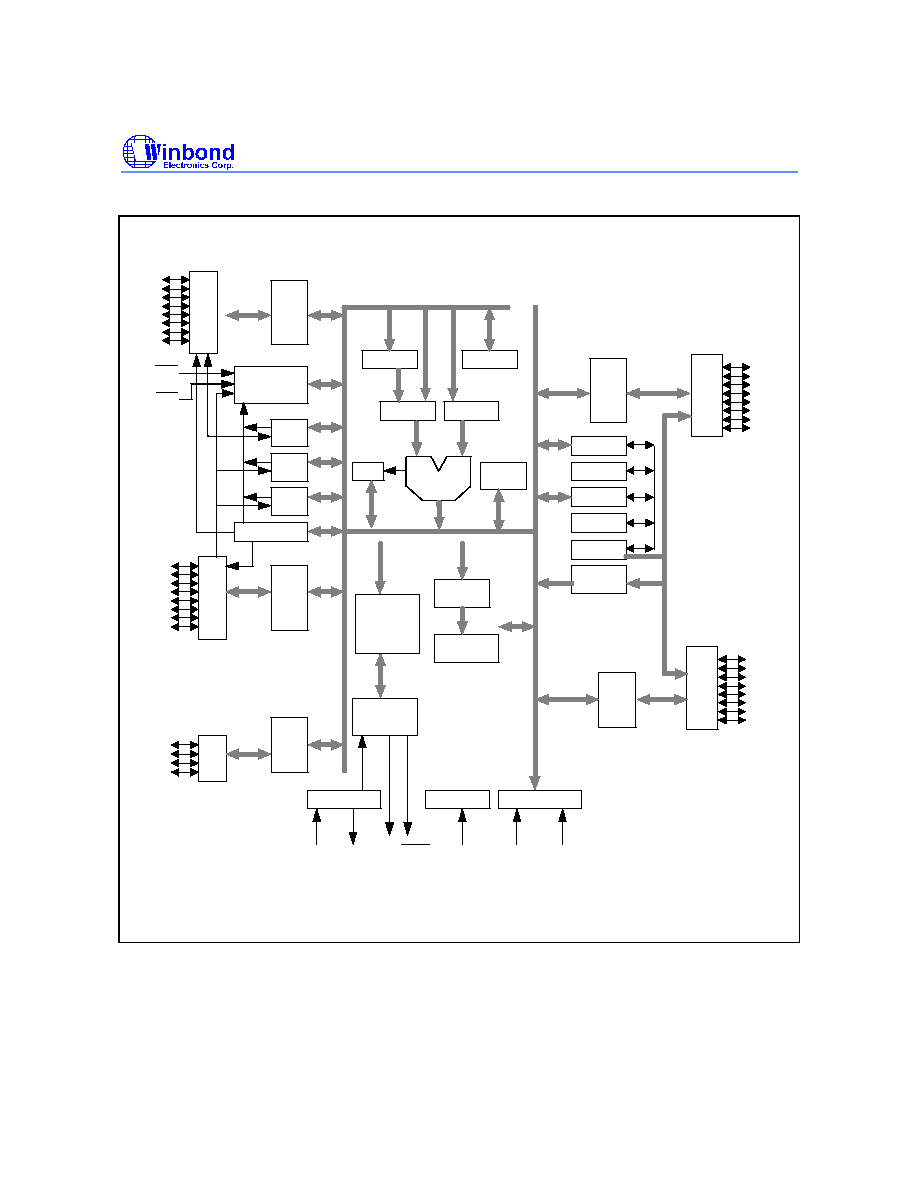
W78C54
- 4 -
BLOCK DIAGRAM
P3.0
~
P3.7
P1.0
~
P1.7
ALU
Port 0
Latch
Port 1
Latch
Timer
1
Timer
0
Timer
2
Port
1
UART
XTAL1
PSEN
ALE
GND
VCC
RST
XTAL2
Oscillator
Interrupt
PSW
16KB
ROM
Instruction
Decoder
&
Sequencer
Reset Block
Bus & Clock
Controller
SFR RAM
Address
Power control
256 bytes
RAM & SFR
Stack
Pointer
B
Addr. Reg.
Incrementor
PC
DPTR
Temp Reg.
T2
T1
ACC
Port 3
Latch
Port 4
Latch
Port
3
Port 2
Latch
P4.0
~
P4.3
Port
4
Port
0
Port
2
P2.0
~
P2.7
P0.0
~
P0.7
INT2
INT3
Figure 2. Architecture of the W78C54

W78C54
Publication Release Date: December 1997
- 5 -
Revision A2
FUNCTIONAL DESCRIPTION
The W78C54 is pin-to-pin compatible with the W78C52, except that the internal 8K mask ROM has
been replaced with 16K of internal mask ROM. The processor supports 111 different opcodes and
references both 64K program address space and 64K data storage space.
Clock
The W78C54 is designed to be used with either a crystal oscillator or an external clock. Internally, the
clock is divided by two before it is used. This makes the W78C54 relatively insensitive to duty cycle
variations in the clock.
Crystal Oscillator
The
W78C54
incorporates a built-in crystal oscillator. To make the oscillator work, a crystal is
connected across pins XTAL1 and XTAL2. In addition, a load capacitance of 30 pf (typically) must be
connected from each pin to ground. Resistor must also be connected from XTAL1 to XTAL2 to
provide a DC bias when the crystal frequency is above 24 MHz.
External Clock
An external clock should be connected to pin XTAL1. Pin XTAL2 should be left unconnected. The
XTAL1 input is a CMOS-type input, as required by the crystal oscillator. As a result, the external clock
signal should have an input one level greater than 3.5 volts.
Power Management
Idle Mode
The idle mode is entered by setting the IDLE bit in the PCON register. In the idle mode, the internal
clock to the processor is stopped. The peripherals and the interrupt logic continue to be clocked. The
processor will exit idle mode when either an interrupt or a reset occurs.
Power-down Mode
When the PD bit of the PCON register is set, the processor enters the power-down mode. In this
mode all of the clocks are stopped, including the oscillator. The only way to exit power-down mode is
by a reset.
Reset
The external RESET signal is sampled at S5P2. To take effect, it must be held high for at least two
machine cycles while the oscillator is running.
An internal trigger circuit in the reset line is used to deglitch the reset line when the
W78C54
is used
with an external RC network. The reset logic also has a special glitch removal circuit that ignores
glitches on the reset line.
During reset, the ports are initialized to FFH, the stack pointer to 07H, PCON (with the exception of
bit 4) to 00H, and all of the other SFR registers except SBUF to 00H. SBUF is not reset.
New Defined Peripheral
In order to be more suitable for I/O, an extra 4-bit bit-addressable port P4 and two external interrupt
INT2, INT3 has been added to either the PLCC or QFP 44 pin package. And description follows:

W78C54
- 6 -
1. INT2 / INT3
Two additional external interrupts, INT2 and INT3, whose functions are similar to those of external
interrupt 0 and 1 in the standard 80C52. The functions/status of these interrupts are
determined/shown by the bits in the XICON (External Interrupt Control) register. The XICON register
is bit-addressable but is not a standard register in the standard 80C52. Its address is at 0C0H. To
set/clear bits in the XICON register, one can use the "SETB (/CLR) bit" instruction. For example,
"SETB 0C2H" sets the EX2 bit of XICON.
2. PORT4
Another bit-address port P4 is also available except only 4 bits (P4<3:0>) can be used. This port
address is located at 0D8H with the same function as that of port P1,except the P4.3 and P4.2 are
alternative function pins. It can be used as general I/O pins or external interrupt input sources
(INT2/INT3).
Example:
P4
REG
0D8H
MOV
P4, #0AH
; Output data "A" through P4.0
-
P4.3.
MOV
A, P4
; Read P4 status to Accumulator.
SETB
P4.0
; Set bit P4.0
CLR
P4.1
; Clear bit P4.1
Reduce EMI Emission
Because of the large on-chip mask-ROM, when a program is running in internal ROM space, the ALE
will be unused. The transition of ALE will cause noise, so it can be turned off to reduce the EMI
emission if it is useless. Turning off the ALE signal transition only requires setting the bit 0 of the
AUXR SFR, which is located at 08Eh. When ALE is turned off, it will be reactivated when the program
accesses external ROM/RAM data or jumps to execute an external ROM code. The ALE signal will
turn off again after it has been completely accessed or the program returns to internal ROM code
space..
POF Flag
The Power-Off-Reset flag is set by on-chip circuitry when the V
CC
level rises from 0 to 5V. The POF
bit can be set/cleared by software allowing a user to determine if the reset is the result of a power-on
or a warm up by external reset. To avoid effect of POF flag, the power voltage must remain above
3V.
Timers 0, 1, and 2
Timers 0, 1, and 2 each consist of two 8-bit data registers. These are called TL0 and TH0 for Timer 0,
TL1 and TH1 for Timer 1, and TL2 and TH2 for Timer 2. The TCON and TMOD registers provide
control functions for timers 0, 1. The T2CON register provides control functions for Timer 2. RCAP2H
and RCAP2L are used as reload/capture registers for Timer 2.
The operations of Timer 0 and Timer 1 are the same as in the W78C51. Timer 2 is a special feature
of the W78C52C: it is a 16-bit timer/counter that is configured and controlled by the T2CON register.
Like Timers 0 and 1, Timer 2 can operate as either an external event counter or as an internal timer,
depending on the setting of bit C/T2 in T2CON. Timer 2 has three operating modes: capture, auto-
reload, and baud rate generator. The clock speed at capture or auto-reload mode is the same as that
of Timers 0 and 1.

W78C54
Publication Release Date: December 1997
- 7 -
Revision A2
DESCRIPTIONS OF THE SPECIAL FUNCTION REGISTERS (SFRS)
SYM.
DEFINITION
ADDR.
MSB BIT ADDRESS, SYMBOL LSB
RESET
B
B register
F0H
(F7)
(F6)
(F5)
(F4)
(F3)
(F2)
(F1)
(F0)
00000000B
ACC
Accumulator
E0H
(E7)
(E6)
(E5)
(E4)
(E3)
(E2)
(E1)
(E0)
00000000B
P4*
Port 4
D8H
-
-
-
-
(DB)
INT2
(DA)
INT3
(D9)
(D8)
xxxx0000B
PSW
Program status word
D0H
(D7)
CY
(D6)
AC
(D5)
F0
(D4)
RS1
(D3)
RS0
(D2)
OV
(D1)
-
(D0)
P
00000000B
TH2
T2 reg. high
CDH
00000000B
TL2
T2 reg. low
CCH
00000000B
RCAP2H
T2 capture high
CBH
00000000B
RCAP2L
T2 capture low
CAH
00000000B
T2CON
Timer 2 control
C8H
(CF)
TF2
(CE)
EXF2
(CD)
RCLK
(CC)
TCLK
(CB)
EXEN2
(CA)
TR2
(C9)
C/T2
(C8)
CP/RL2
00000000B
XICON*
External interrupt
control
C0H
(C7)
PX3
(C6)
EX3
(C5)
IE3
(C4)
IT3
(C3)
PX2
(C2)
EX2
(C1)
IE2
(C0)
IT2
00000000B
IP
Interrupt priority
B8H
-
-
PT2
PS
PT1
PX1
PT0
PX0
xx000000B
P3
Port 3
B0H
(B7)
RD
(B6)
WR
(B5)
T1
(B4)
T0
(B3)
INT1
(B2)
INT0
(B1)
TXD
(B0)
RXD
11111111B
IE
Interrupt enable
A8H
(AF)
EA
(AE)
-
(AD)
ET2
(AC)
ES
(AB)
ET1
(AA)
EX1
(A9)
ET0
(A8)
EX0
00000000B
P2
Port 2
A0H
(A7)
A15
(A6)
A14
(A5)
A13
(A4)
A12
(A3)
A11
(A2)
A10
(A1)
A9
(A0)
A8
11111111B
SBUF
Serial buffer
99H
xxxxxxxxB
SCON*
Serial control
98H
(9F)
SM0/FE
(9E)
SM1
(9D)
SM2
(9C)
REN
(9B)
TB8
(9A)
RB8
(99)
TI
(98)
RI
00000000B
P1*
Port 1
90H
(97)
(96)
(95)
(94)
(93)
(92)
(91)
T2EX
(90)
T2
11111111B
AUXR*
Auxiliary
8EH
-
-
-
-
-
-
-
AO
xxxxxxx0B
TH1
Timer high 1
8DH
00000000B
TH0
Timer high 0
8CH
00000000B
TL1
Timer low 1
8BH
00000000B
TL0
Timer low 0
8AH
00000000B
TMOD
Timer mode
89H
GATE
C/T
M1
M0
GATE
C/T
M1
M0
00000000B
TCON
Timer control
88H
(8F)
TF1
(8E)
TR1
(8D)
TF0
(8C)
TR0
(8B)
IE1
(8A)
IT1
(89)
IE0
(88)
IT0
00000000B
PCON*
Power control
87H
SMOD
SMOD0
-
POF+
GF1
GF0
PD
IDL
00xxxx00B
DPH
Data pointer high
83H
00000000B
DPL
Data pointer low
82H
00000000B
SP
Stack pointer
81H
00000111B
P0
Port 0
80H
(87)
(86)
(85)
(84)
(83)
(82)
(81)
(80)
11111111B
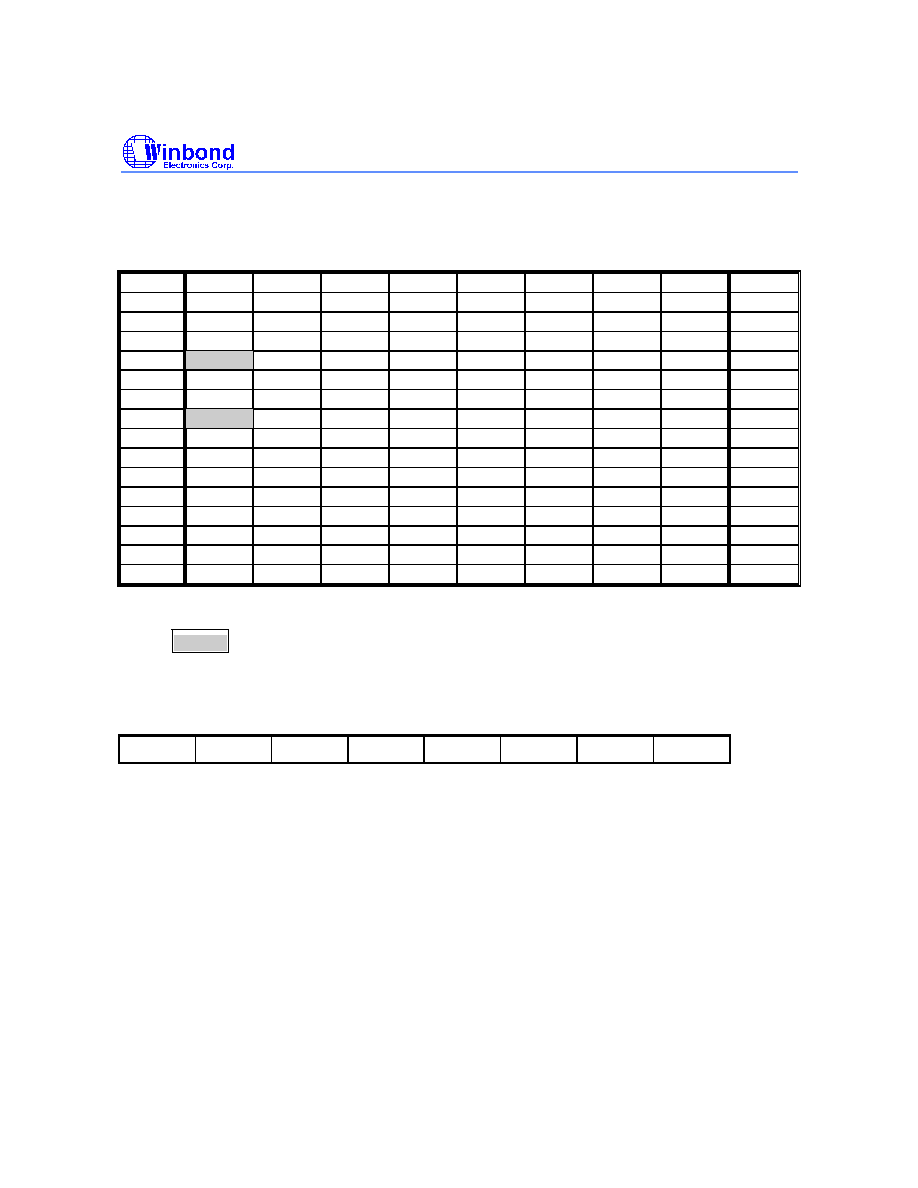
W78C54
- 8 -
Note: In column
BIT_ADDRESS, SYMBOL
, containing ( ) item means the bit address.
* SFRs modified or added to the W78C52. + Reset value depends on reset condition.
W78C54 SFRs address location map:
F8
FF
F0
+ B
F7
E8
EF
E0
+ ACC
E7
D8
+P4
DF
D0
+ PSW
D7
C8
+T2CON
RCAP2L
RCAP2H
TL2
TH2
CF
C0
+XICON
C7
B8
+ IP
BF
B0
+ P3
B7
A8
+ IE
AF
A0
+ P2
A7
98
+ SCON
SBUF
9F
90
+ P1
97
88
+ TCON
TMOD
TL0
TL1
TH0
TH1
AUXR
8F
80
+P0
SP
DPL
DPH
PCON
87
Notes:
1. + SFR is bit-addressable.
2. is additional defined function.
Power-off Flag
***PCON - Power Control (87H)
SMOD
SMOD0
-
POF
GF1
GF0
PD
IDL
SMOD:
Double baud rate bit. When set to a 1, the baud rate is doubled when the serial port is
being used in either modes 1, 2, 3.
SMOD0:
Enable FE bit in SCON. This bit is an alternative switch of SM0 and FE (Frame Error)
bit.
When set to a 1, SCON.7 means a FE bit, otherwise a SM0 bit.
POF:
Power off flag. Bit is set by hardware when power on reset. It can be cleared by software
to determine chip reset is a warm boot or cold boot.
GF1, GF0: These two bits are general-purpose flag bits for the user.
PD:
Power down mode bit. Set it to enter power down mode.
IDL:
Idle mode bit. Set it to enter idle mode.
The power-off flag is located at PCON.4. This bit is set when V
DD
has been applied to the part. It can
be used to determine if a reset is a warm boot or a cold boot if it is subsequently reset by software.
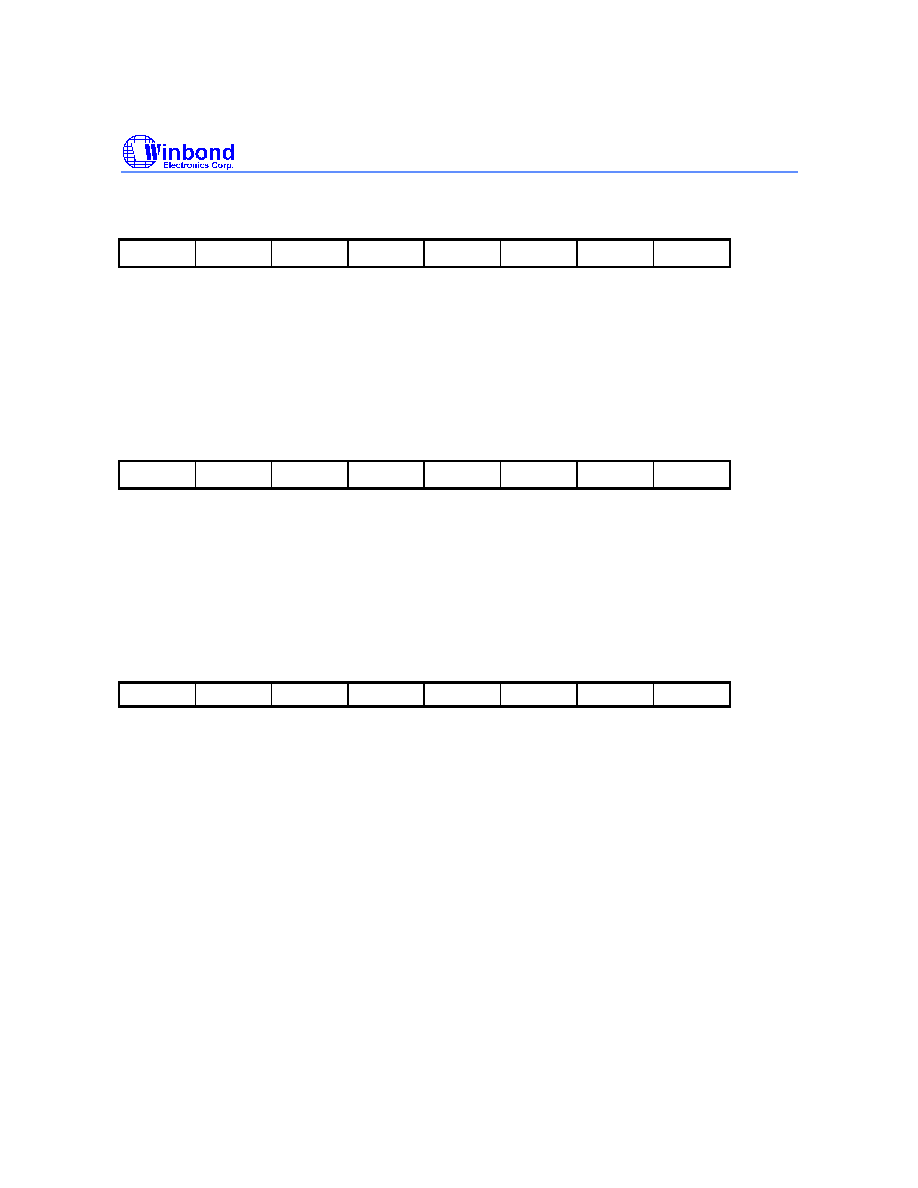
W78C54
Publication Release Date: December 1997
- 9 -
Revision A2
* Interrupts
***IE - Interrupt Enable (A8H)
EA
-
ET2
ES
ET1
EX1
ET0
EX0
EA: Lobal interrupt enable flag
ET2: Timer 2 overflow interrupt enable
ES: Serial port interrupt enable
EX1: External interrupt 1 enable
ET1: Timer 1 overflow interrupt enable
EX0: External interrupt 0 enable
***IP - Interrupt Priority (B8H)
-
-
PT2
PS
PT1
PX1
PT0
PX0
PT2: Timer 2 interrupt priority high if set
PS: Serial port priority high if set
PT1: Timer 1 interrupt priority high if set
PX1: External interrupt 1 priority high if set
PT0: Timer 0 interrupt priority high if set
PX0: External interrupt 0 priority high if set
***XICON - External Interrupt Control (C0H)
PX3
EX3
IE3
IT3
PX2
EX2
IE2
IT2
PX3: External interrupt 3 priority high if set
EX3: External interrupt 3 enable if set
IE3: If IT3 = 1, IE3 is set/cleared automatically by hardware when interrupt is detected/serviced
IT3: External interrupt 3 is falling-edge/low-level triggered when this bit is set/cleared by software
PX2: External interrupt 2 priority high if set
EX2: External interrupt 2 enable if set
IE2: If IT2 = 1, IE2 is set/cleared automatically by hardware when interrupt is detected/serviced
IT2: External interrupt 2 is falling-edge/low-level triggered when this bit is set/cleared by software
The W78C54 supports an eight-source and a four-priority-level interrupt architectures. Besides the
SFRs of IP and IE to control the six-source of the standard 8052 interrupt functions. There is an
another SFR (XICON) to control the extra two-source of the external interrrupt (INT2 and INT3). This
priority scheme is formed by combining IPH with IP to determine the priority of each interrupt. Except
the INT2 and INT3, they are not defined in IP
SFR
but in XICON.
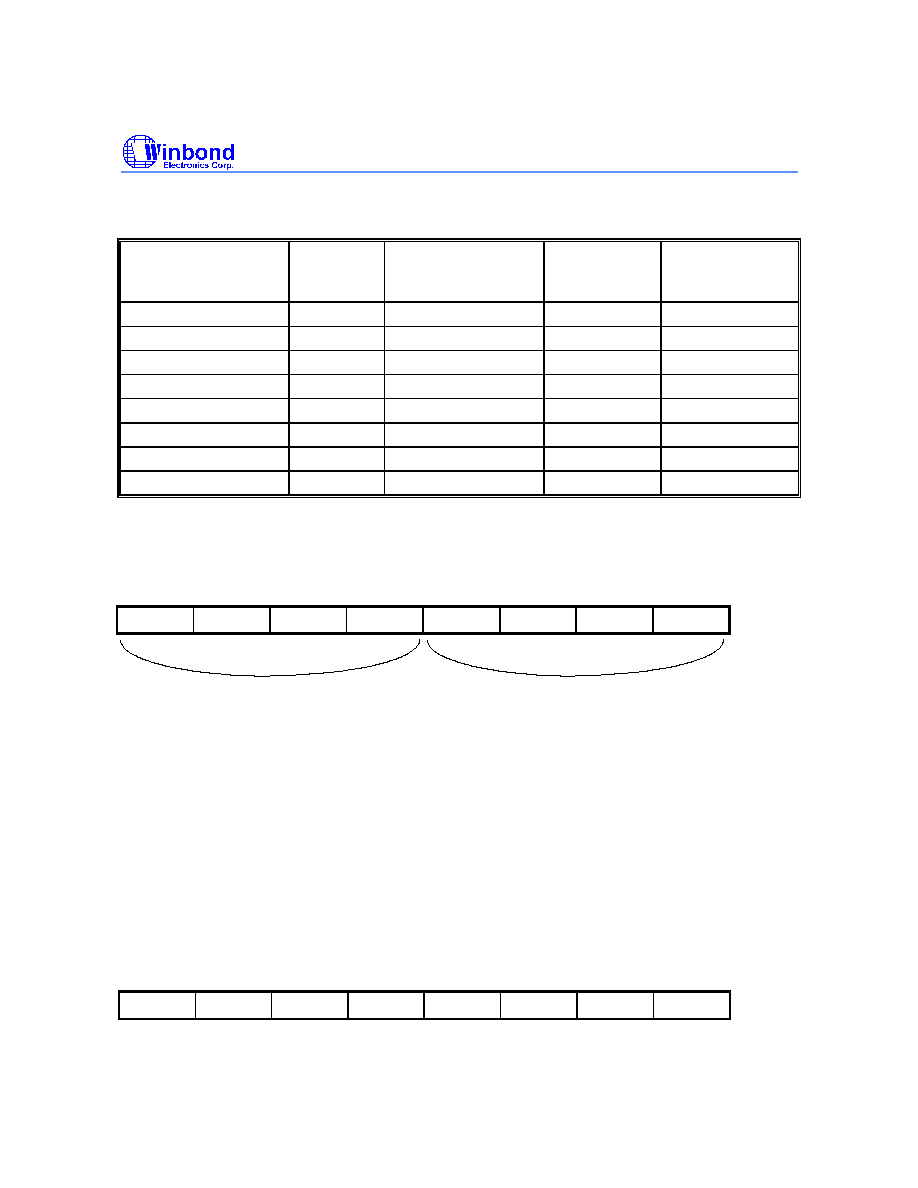
W78C54
- 10 -
Following tables show the interrupt informations and priority definitions.
Eight-source interrupt informations:
INTERRUPT
SOURCE
VECTOR
ADDRESS
POLLING
SEQUENCE WITHIN
PRIORITY LEVEL
ENABLE
REQUIRED
SETTINGS
INTERRUPT
TYPE
EDGE/LEVEL
External Interrupt 0
03H
0 (highest)
IE.0
TCON.IT0
Timer/Counter 0
0BH
1
IE.1
-
External Interrupt 1
13H
2
IE.2
TCON.IT1
Timer/Counter 1
1BH
3
IE.3
-
Serial Port
23H
4
IE.4
-
Timer/Counter 2
2BH
5
IE.5
-
External Interrupt 2
33H
6
XICON.EX2
XICON.IT2
External Interrupt 3
3BH
7 (lowest)
XICON.EX3
XICON.IT3
*Timer/Counter
***TL0, TH0, TL1, TH1, TL2, TH2, RCAP2L, RCAP2H
***TMOD - Timer 0, 1 mode (89H)
GATE
C//T
M1
M0
GATE
C//T
M1
M0
TIMER0
TIMER1
GATE: Gating control. When set, Timer/counter x is enabled only while INTx pin is high and TRx
control pin is set. When cleared, Timer x is enabled whenever the TRx conrol bit is set.
C//T:
Timer or Counter Selector. Cleared for timer operation. Set for counter operation.
M1 M0: Operating Mode
0 0: 13-bit Timer/Counter.
0 1: 16-bit Timer/Counter.
1 0: 8-bit auto-reload Timer/Counter. THx holds a value which is to be reloaded into TLx
each time it overflows.
1 1: Timer 0: TL0 is an 8-bit timer/counter controlled by the standard Timer 0 control bits.
TH0 is an 8-bit timer only controlled by Timer 1 control bits.
Timer 1: Timer/counter 1 stopped.
***TCON - Timer 0, 1 Control (88H)
TF1
TR1
TF0
TR0
IE1
IT1
IE0
IT0
TF1: Timer 1 overflow flag. Set by hardware on timer/counter overflow. cleared by hardware when
processor vectors to interrupt routine.

W78C54
Publication Release Date: December 1997
- 11 -
Revision A2
TR1: Timer 1 run control bit. Set/cleared by software to turn timer/counter on or off.
TF0: Timer 0 overflow flag. Set by hardware on timer/counter overflow. Cleared by hardware when
processor vectors to interrupt routine.
TR0: Timer 0 run control bit. Set/cleared by software to turn timer/counter on or off.
IE1: Interrupt 1 edge flag. Set by hardware when external interrupt edge detected. Cleared when
interrupt processed.
IT1: Interrupt 1 type control bit. Set/cleared by software to specify falling edge/low level triggered
external interrupt.
IE0: Interrupt 0 edge flag. Set by hardware when external interrupt edge detected. Cleared when
interrupt processed.
IT0: Interrupt 0 type control bit. Set/cleared by software to specify falling edge/low level triggered
external interrupt.
***T2CON - Timer 2 Control (C8H)
TF2
EXF2
RCLK
TCLK
EXEN2
TR2
C//T
CP//RL2
TF2:
Timer 2 overflow flag. Set by a Timer 2 overflow and must be cleared by software. TF2 will
not be set when RCLK = 1 or TCLK = 1.
EXF2:
Timer2 external flag. Set when either a capture or reload is caused by a negative transition
on T2EX and EXEN2 = 1. When Timer 2 interrupt is enabled, EXF2 = 1 will cause the CPU
to vector to the Timer 2 interrupt routine. EXF2 must be cleared by software.
RCLK:
Receive clock flag. RCLK = 1 causes the serial port to use Timer 2 overflow pulses for its
receive clock in mode 1 and 3. RCLK = 0 causes Timer 1 overflow to be used for the
receive
clock.
TCLK:
Transmit clock flag. TCLK = 1 causes the serial port to use Timer 2 overflow pulses for its
transmit clock in mode 1 and 3. TCLK = 0 causes Timer 1 overflow to be used for the
transmit clock.
EXEN2: Timer 2 external enable flag. EXEN2 = 1 allows a capture or reload to occur as a result of a
negative transition on T2EX if Timer 2 is not used to clock the serial port. EXEN2 = 0
causes
Timer 2 to ignore events at T2EX.
TR2:
TR2 = 1/0: turns on/off Timer 2.
C//T:
Timer or Counter select. Set 1/0 for external event counter(falling edge triggered)/inter
timer.
CP//RL2: Capture/reload flag.
*Reduced EMI Mode
The AO bit in the AUXR register, when set, disables the ALE output.
***AUXR - Auxiliary Register (8EH)
-
-
-
-
-
-
-
AO
AO: Turn off ALE output.
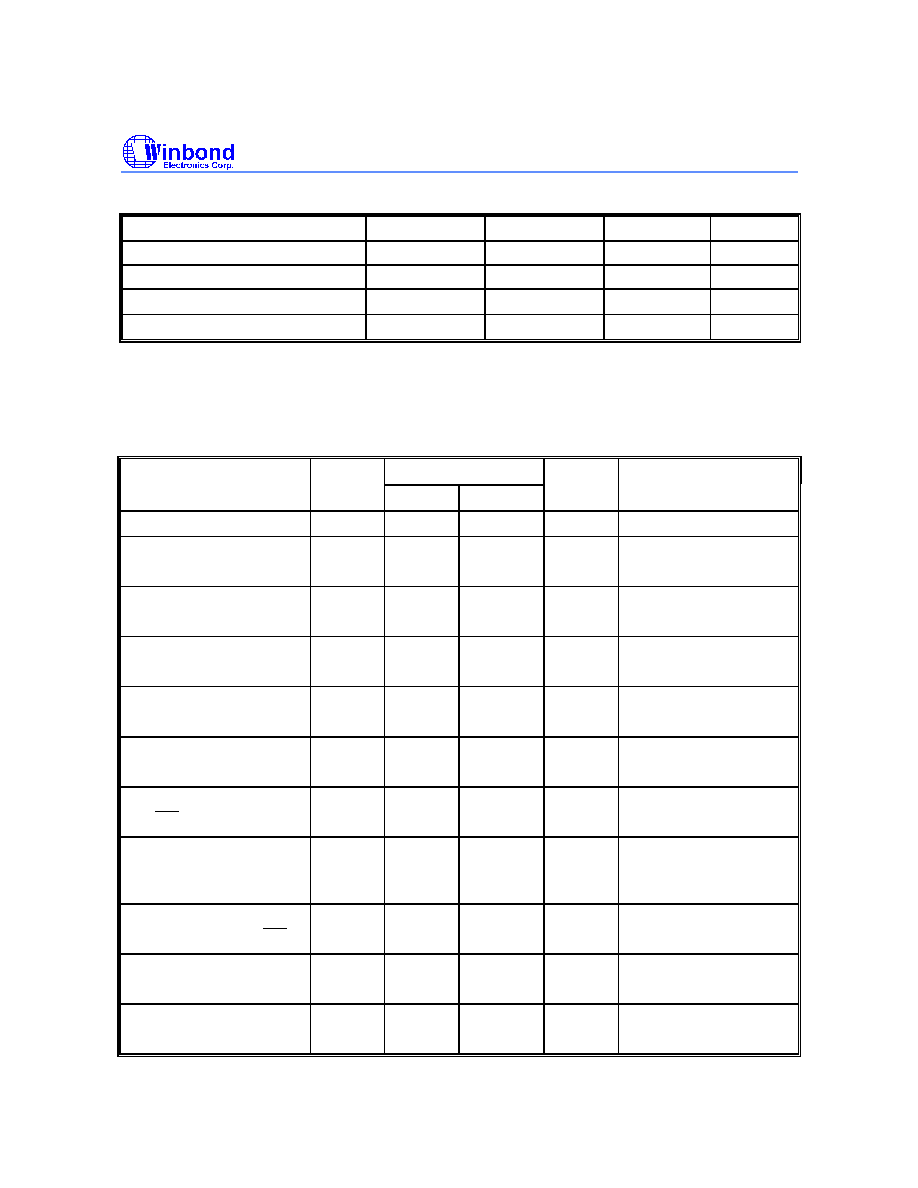
W78C54
- 12 -
ABSOLUTE MAXIMUM RATINGS
PARAMETER
SYMBOL
MIN.
MAX.
UNIT
DC Power Supply
V
CC
-
V
SS
-0.3
+7.0
V
Input Voltage
V
IN
V
SS
-0.3
V
CC
+0.3
V
Operating Temperature
T
A
0
70
∞
C
Storage Temperature
T
ST
-55
+150
∞
C
Note: Exposure to conditions beyond those listed under Absolute Maximum Ratings may adversely affect the life and reliability
of the device.
DC CHARACTERISTICS
(V
DD
-
V
SS
= 5V
±
10%, T
A
= 25
∞
C, Fosc = 20 MHz, unless otherwise specified.)
PARAMETER
SYM.
SPECIFICATION
UNIT
TEST CONDITIONS
MIN.
MAX.
Operating Voltage
V
DD
4.5
5.5
V
Operating Current
I
DD
-
20
mA
No load
V
DD
= 5.5V
Idle Current
I
IDLE
-
6
mA
Idle mode
V
DD
= 5.5V
Power Down Current
I
PWDN
-
50
µ
A
Power-down mode
V
DD
= 5.5V
Input Current
P1, P2, P3, P4
I
IN1
-50
+10
µ
A
V
DD
= 5.5V
V
IN
= 0V or V
DD
Input Current
RST
I
IN2
-10
+300
µ
A
V
DD
= 5.5V
0 < V
IN
< V
DD
Input Leakage Current
P0, EA
I
LK
-10
+10
µ
A
V
DD
= 5.5V
0V < V
IN
< V
DD
Logic 1 to 0 Transition
Current
P1, P2, P3, P4
I
TL
[*4]
-500
-200
µ
A
V
DD
= 5.5V
V
IN
= 2.0V
Input Low Voltage
P0, P1, P2, P3, P4, EA
V
IL1
0
0.8
V
V
DD
= 4.5V
Input Low Voltage
RST
V
IL2
0
0.8
V
V
DD
= 4.5V
Input Low Voltage
XTAL1[*4]
V
IL3
0
0.8
V
V
DD
= 4.5V
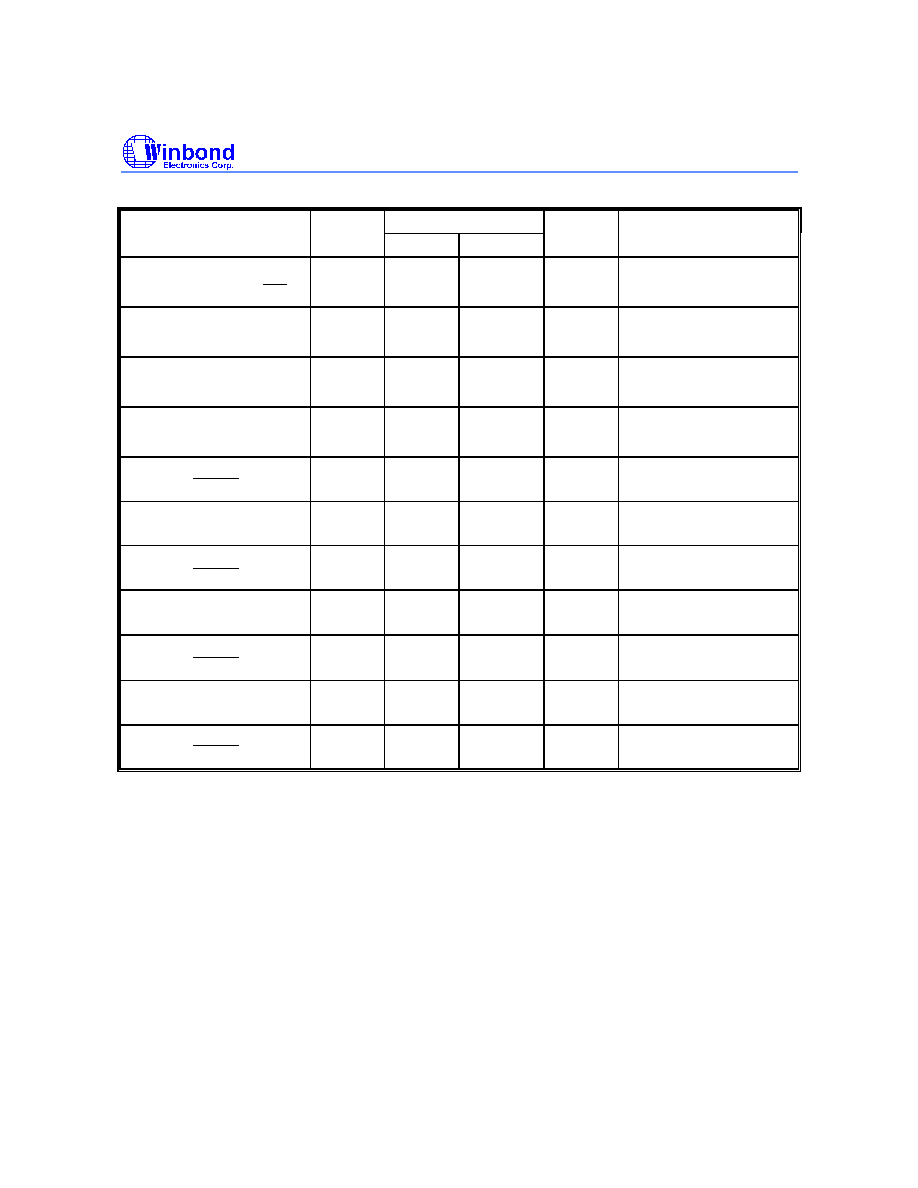
W78C54
Publication Release Date: December 1997
- 13 -
Revision A2
DC Characteristics, continued
PARAMETER
SYM.
SPECIFICATION
UNIT
TEST CONDITIONS
MIN.
MAX.
Input High Voltage
P0, P1, P2, P3, P4, EA
V
IH1
2.4
V
DD
+0.2
V
V
DD
= 5.5V
Input High Voltage
RST
V
IH2
3.5
V
DD
+0.2
V
V
DD
= 5.5V
Input High Voltage
XTAL1 [*4]
V
IH3
3.5
V
DD
+0.2
V
V
DD
= 5.5V
Output Low Voltage
P1, P2, P3, P4
V
OL1
-
0.45
V
V
DD
= 4.5V
I
OL
= +2 mA
Output Low Voltage
P0, ALE, PSEN [*3]
V
OL2
-
0.45
V
V
DD
= 4.5V
I
OL
= +4 mA
Sink Current
P1, P2, P3, P4
I
SK1
4
8
mA
V
DD
= 4.5V
Vs = 0.45V
Sink Current
P0, ALE, PSEN
I
SK2
10
14
mA
V
DD
= 4.5V
Vs = 0.45V
Output High Voltage
P1, P2, P3, P4
V
OH1
2.4
-
V
V
DD
= 4.5V
I
OH
= -100
µ
A
Output High Voltage
P0, ALE, PSEN [*3]
V
OH2
2.4
-
V
V
DD
= 4.5V
I
OH
= -400
µ
A
Source Current
P1, P2, P3, P4
I
SR1
-120
-180
µ
A
V
DD
= 4.5V
Vs = 2.4V
Source Current
P0, ALE, PSEN
I
SR2
-10
-14
mA
V
DD
= 4.5V
Vs = 2.4V
Notes:
*1. RST pin is a Schmitt trigger input. RST has internal pull-low resistors of about 30 K
.
*3. P0, ALE and /PSEN are tested in the external access mode.
*4. XTAL1 is a CMOS input.
*5. Pins of P1, P2, P3, P4 can source a transition current when they are being externally driven from 1 to 0. The transition
current reaches its maximum value when V
IN
approximates to 2V.
AC CHARACTERISTICS
The AC specifications are a function of the particular process used to manufacture the part, the
ratings of the I/O buffers, the capacitive load, and the internal routing capacitance. Most of the
specifications can be expressed in terms of multiple input clock periods (T
CP
), and actual parts will
usually experience less than a
±
20 nS variation. The numbers below represent the performance
expected from a 0.8 micron CMOS process when using 2 and 4 mA output buffers.
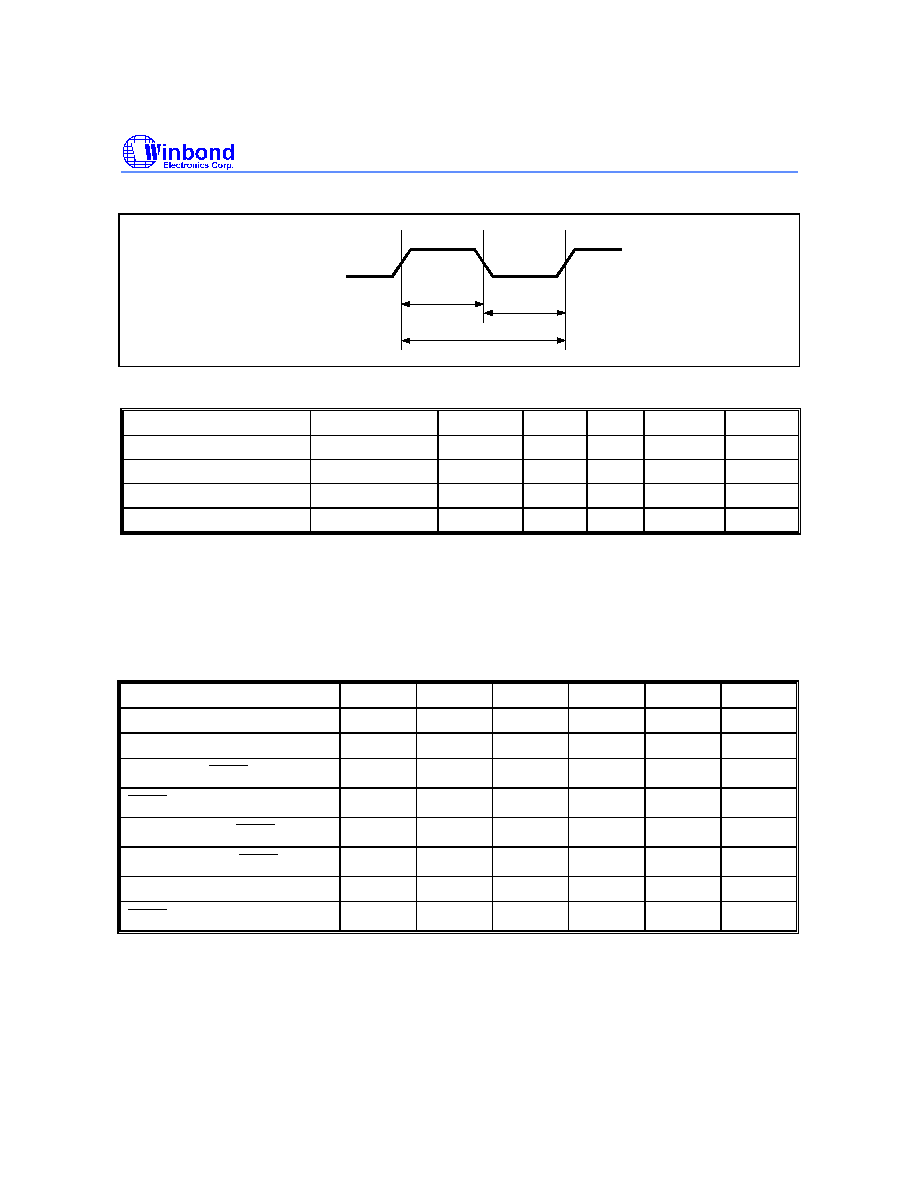
W78C54
- 14 -
Clock Input Waveform
T
T
XTAL1
F
CH
CL
OP,
T
CP
Continued
PARAMETER
SYMBOL
MIN.
TYP.
MAX.
UNIT
NOTES
Operating Speed
F
OP
0
-
40
MHz
1
Clock Period
T
CP
25
-
-
nS
2
Clock High
T
CH
10
-
-
nS
3
Clock Low
T
CL
10
-
-
nS
3
Notes:
1. The clock may be stopped indefinitely in either state.
2. The T
CP
specification is used as a reference in other specifications.
3. There are no duty cycle requirements on the XTAL1 input.
Program Fetch Cycle
External Program Memory Fetch Cycle
(see Figure 6)
PARAMETER
SYMBOL
MIN.
TYP.
MAX.
UINT
NOTES
Address Valid to ALE Low
T
AAS
1T
CP
-
-
-
nS
Address Hold After ALE Low
T
AAH
1T
CP
-
-
-
nS
1
ALE Low to PSEN Low
T
APL
1T
CP
-
1T
CP
1T
CP
+
nS
PSEN Low to Data Valid
T
PDA
-
-
2T
CP
nS
2
Data Hold After PSEN High
T
PDH
0
-
1T
CP
nS
3
Data Float After PSEN High
T
PDZ
0
-
1T
CP
nS
ALE Pulse Width
T
ALW
2T
CP
-
2T
CP
2T
CP
+
nS
4
PSEN Pulse Width
T
PSW
3T
CP
-
3T
CP
3T
CP
+
nS
4
Notes:
1. P00-P07, P20-P27 remain stable through entire memory cycle.
2. Memory access time is 3 Tcp.
3. Data has been latched internally prior to /PSEN going high.
4.
is 20 ns (due to buffer driving delay and wire loading).
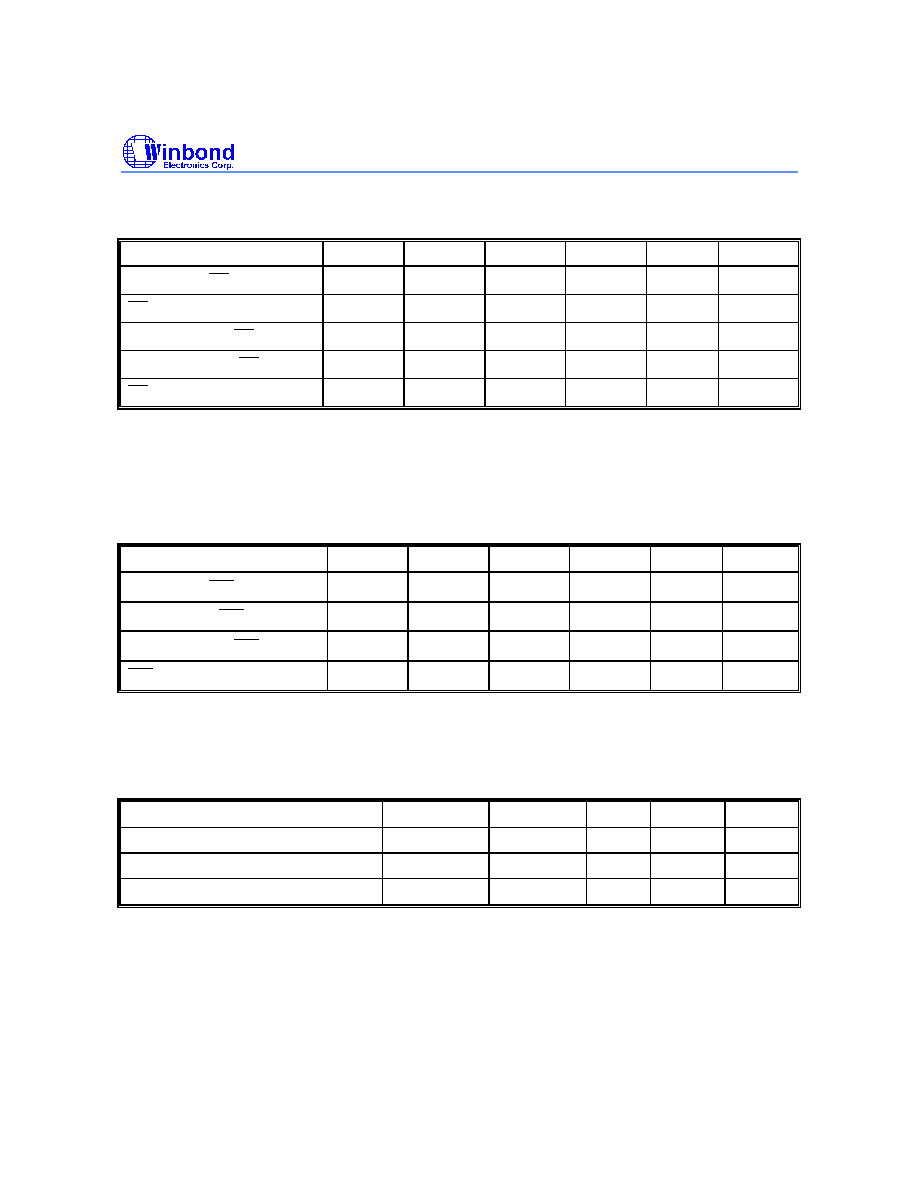
W78C54
Publication Release Date: December 1997
- 15 -
Revision A2
Data Read Cycle
External Data Memory Read Cycle
(see Figure 7)
PARAMETER
SYMBOL
MIN.
TYP.
MAX.
UINT
NOTES
ALE Low to
RD
Low
T
DAR
3 Tcp-
3 Tcp
3 Tcp+
nS
1, 2
RD
Low to Data Valid
T
DDA
-
-
4 Tcp
nS
1
Data hold After
RD
High
T
DDH
0
-
2 Tcp
nS
Data Float After
RD
High
T
DDZ
0
-
2 Tcp
nS
RD
Pulse Width
T
DRD
6 Tcp-
6 Tcp
6 Tcp+
nS
2
Notes:
1. Data Memory access time is 5 Tcp.
2.
is 20 ns (due to buffer driving delay and wire loading.
Data Write Cycle
External Data Memory Write Cycle
(see Figure 8)
PARAMETER
SYMBOL
MIN.
TYP.
MAX.
UINT
NOTE
ALE Low to
WR
Low
T
DAW
3 Tcp-
3 Tcp
3 Tcp+
nS
*
Data Valid to
WR
Low
T
DAD
1 Tcp-
-
-
nS
Data hold After
WR
High
T
DWD
1 Tcp-
-
-
nS
WR
Pulse Width
T
DWR
6 Tcp-
6 Tcp
6 Tcp+
nS
*
*Note:
is 20 ns (due to buffer driving delay and wire loading)
Port Access Cycle
Port Access Cycle
(see Figure 9)
PARAMETER
SYMBOL
MIN.
TYP.
MAX.
UINT
Port Input Setup to ALE Low
T
PDS
1Tcp
-
-
nS
Port Input Hold After ALE Low
T
PDH
0
-
-
nS
Port Output to ALE High
T
PDA
1Tcp-
-
-
nS
Note: Ports are read during S5P2, and output data becomes available at the end of S6P2. The timing data are referenced to
ALE, since it provides a convenient reference.
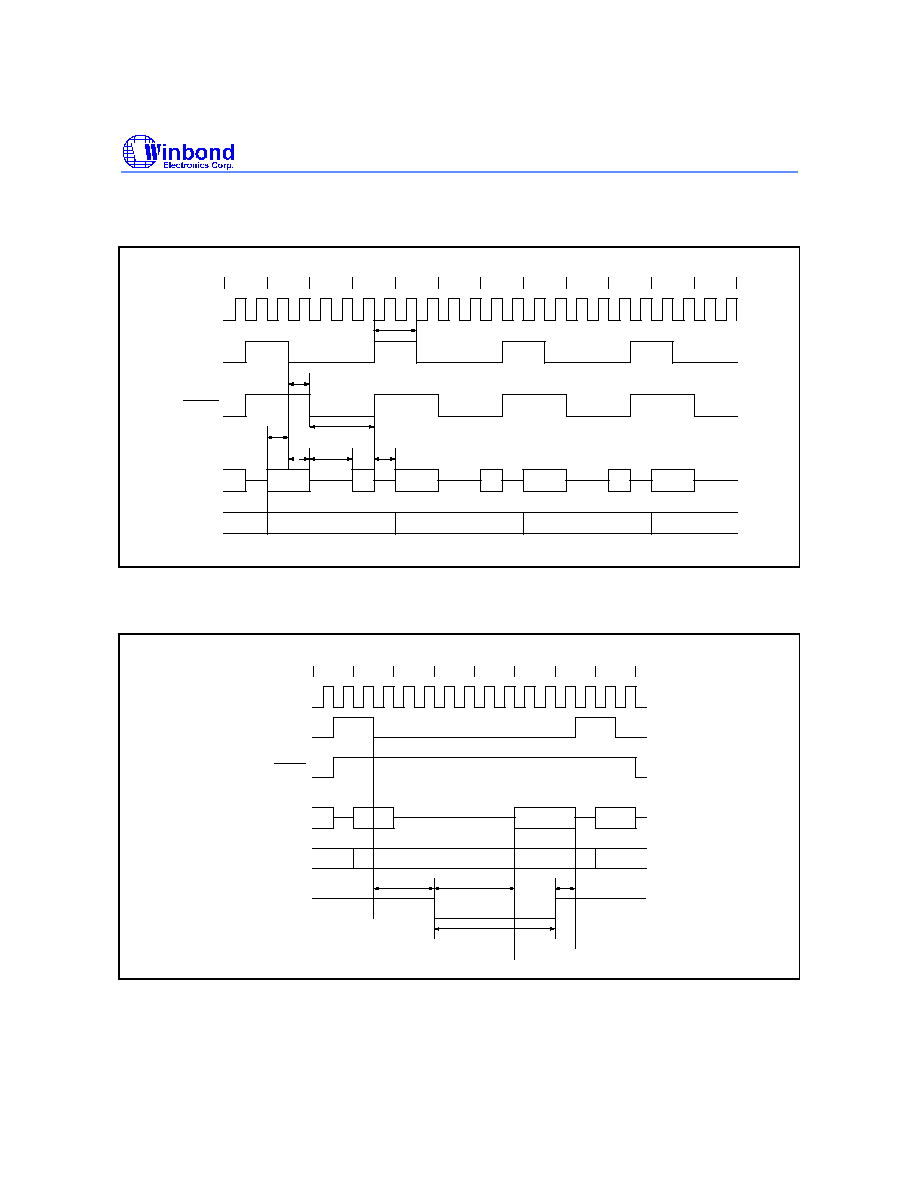
W78C54
- 16 -
TIMING WAVEFORMS
Program Fetch Cycle
XTAL1
S1
S2
S3
S4
S5
S6
S1
S2
S3
S4
S5
S6
ALE
Talw
PSEN
Tapl
Tpsw
Taas
P2
PCH out
PCH out
P0
PCL
out
PCL
out
Taah
Code
Tpda
Tpdh,Tpdz
Code
Code
PCL
out
PCL
out
PCH out
PCH out
Code
Figure 6. External Program Memory Fetch Cycle
Data Read Cycle
XTAL1
S4
S5
S6
S1
S2
S3
S4
S5
ALE
PSEN
P2
DPH or P2 SFR out
P0
Tdar
Data
DPL or
RI out
Tddh,Tddz
/RD
Tdrd
Tdda
Figure7. External Data Memory Read Cycle
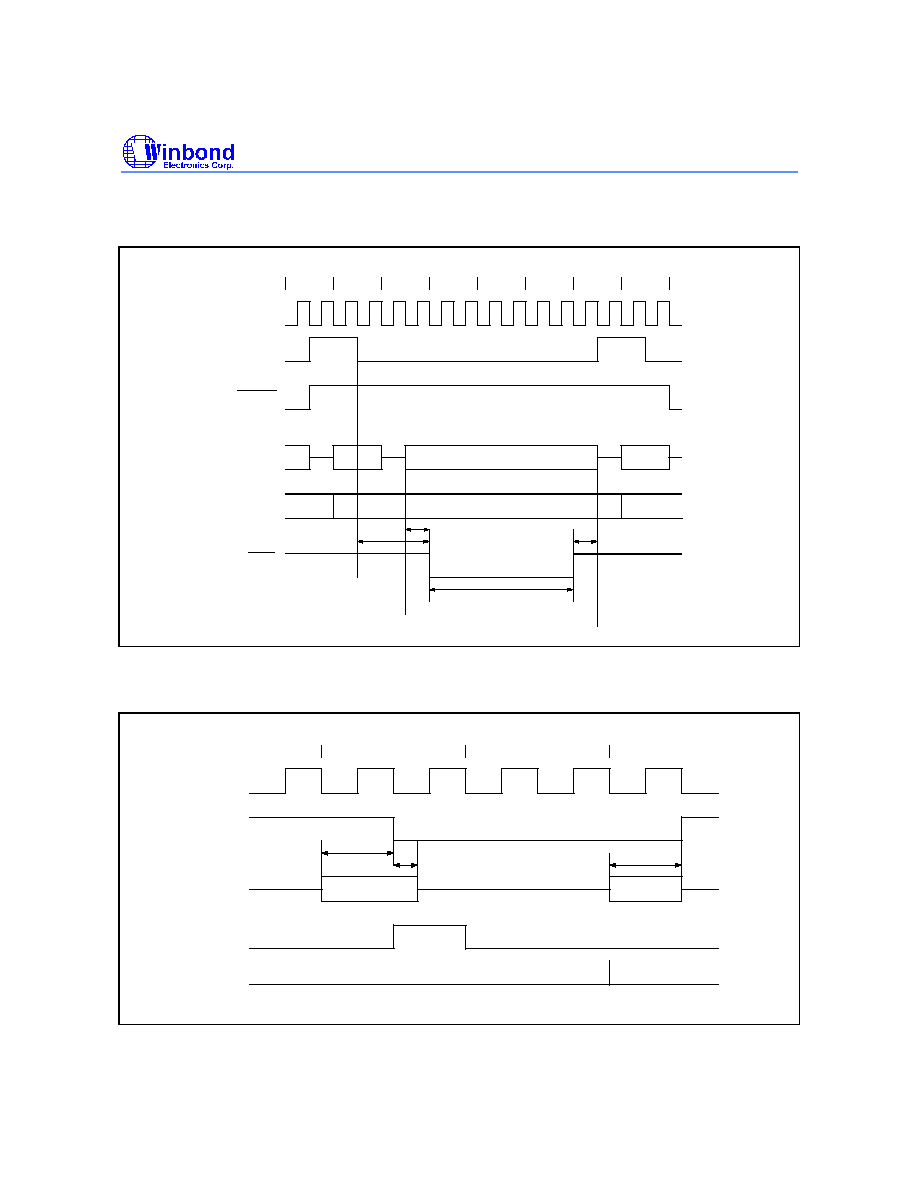
W78C54
Publication Release Date: December 1997
- 17 -
Revision A2
Timing Waveforms, continued
Data Write Cycle
XTAL1
S4
S5
S6
S1
S2
S3
S4
S5
ALE
PSEN
P2
DPH or P2 SFR out
P0
Tdaw
Data
DPL or
RI out
Tdwd
WR
Tdwr
Tdad
Figure 8. External Data Memory Write Cycle
Port Access Cycle
XTAL1
ALE
PORT
Input
Sample
Output
Clock
S5
S6
S1
Data Out
Data In
Tpds
Tpdh
Tpda
Figure 9. Port Access Cycle
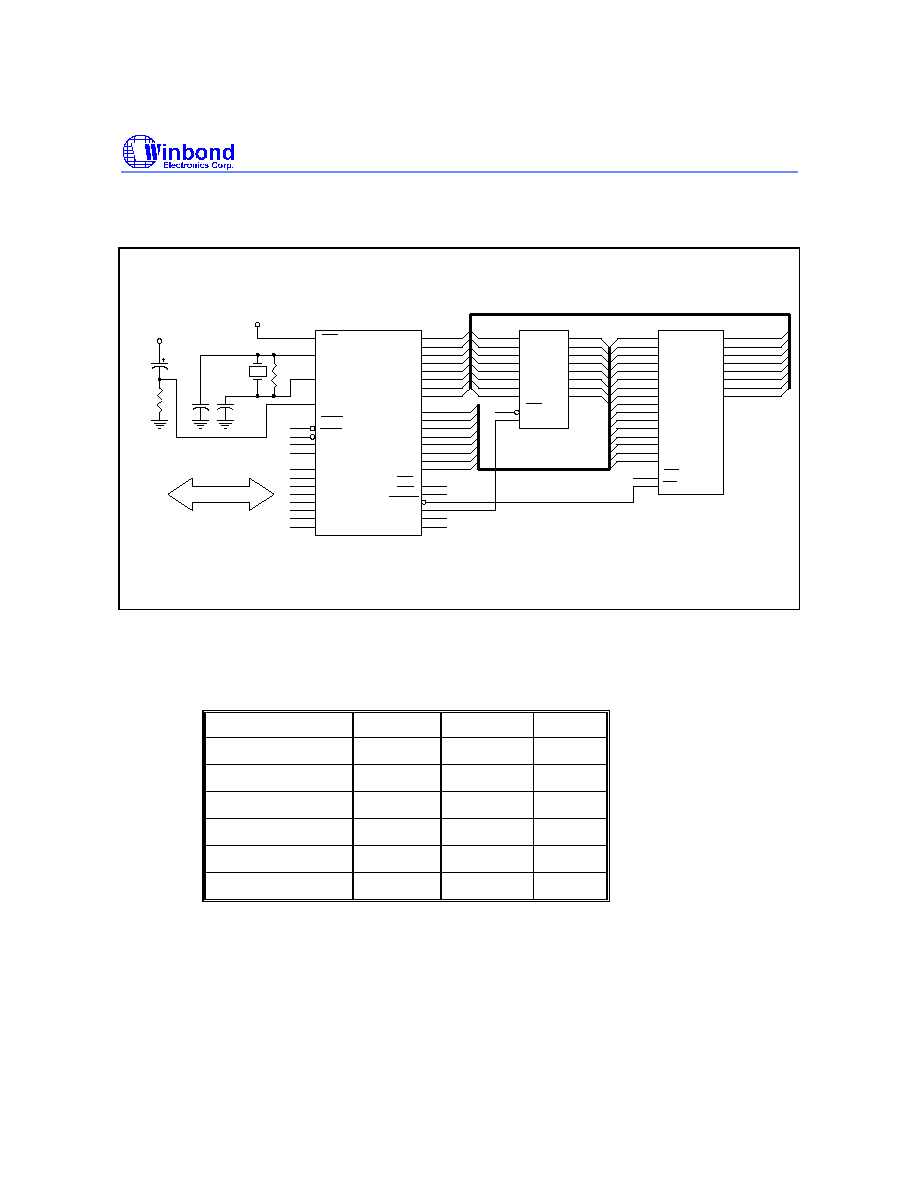
W78C54
- 18 -
APPLICATION CIRCUIT
Expanded External Program Memory and Crystal
AD0
A0
A0
A0
10
A1
9
A2
8
A3
7
A4
6
A5
5
A6
4
A7
3
A8
25
A9
24
A10
21
A11
23
A12
2
A13
26
A14
27
A15
1
CE
20
OE
22
O0
11
O1
12
O2
13
O3
15
O4
16
O5
17
O6
18
O7
19
27512
AD0
D0
3
Q0
2
D1
4
Q1
5
D2
7
Q2
6
D3
8
Q3
9
D4
13
Q4
12
D5
14
Q5
15
D6
17
Q6
16
D7
18
Q7
19
OC
1
G
11
74LS373
AD0
EA
35
X1
21
X2
20
RESET
10
INT0
14
INT1
15
T0
16
T1
17
P1.0
2
P1.1
P1.2
3
P1.3
4
P1.4
5
P1.5
6
P1.6
7
P1.7
8
39
38
37
36
24
25
26
27
28
19
WR
P0.0
P0.1
P0.2
P0.3
P0.4
P0.5
P0.6
P0.7
P2.0
P2.1
P2.2
P2.3
P2.4
P2.5
P2.6
P2.7
RD
18
PSEN
32
ALE
33
TXD
13
RXD
11
W78C54
VCC
10u
8.2K
VCC
CRYSTAL
C1
C2
R
AD1
AD2
AD3
AD4
AD5
AD6
AD7
A8
AD1
AD2
AD3
AD4
AD5
AD6
AD7
GND
A1
A2
A3
A4
A5
A6
A7
A1
A2
A3
A4
A5
A6
A7
A8
A9
AD1
AD2
AD3
AD4
AD5
AD6
AD7
A10
A11
A12
A13
A14
A15
GND
A9
A10
A11
A12
A13
A14
A15
9
29
30
43
42
41
40
31
Figure A
Table 1 Shows the typical values of off-chip components to configure the on-chip oscillator.
Table 1. Off-chip components list
CRYSTAL FREQ.
C1
C2
R
12 MHz
30 pF
30 pF
-
16 MHz
30 pF
30 pF
-
20 MHz
15 pF
15 pF
-
24 MHz
15 pF
15 pF
-
33 MHz
10 pF
10 pF
6.8 K
40MHz
5 pF
5 pF
4.3 K
Notes:
1. Refer to Figure 10 for C1, C2 and R.
2. It is recommended that an oscillator be used as external clock source when operating freq. is above 35MHz. Apply the
external clock signal to XTAL1, and leave XTAL2 float, as shown in Figure 10.
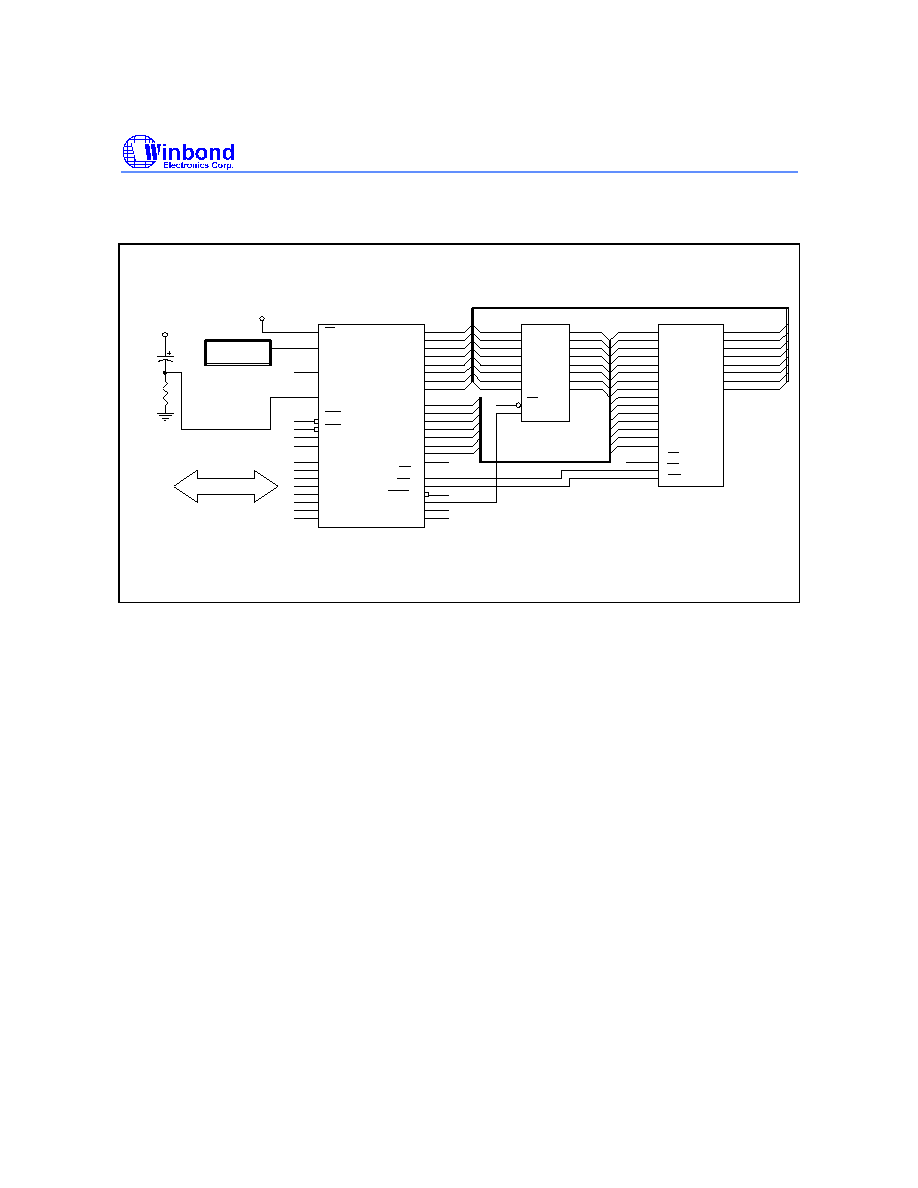
W78C54
Publication Release Date: December 1997
- 19 -
Revision A2
Application Circuit, continued
Expanded External Data Memory and Oscillator
10u
8.2K
VCC
OSCILLATOR
VCC
EA
35
X1
21
X2
20
RESET
10
INT0
14
INT1
15
T0
16
T1
17
P1.0
9
P1.1
2
P1.2
3
P1.3
4
P1.4
5
P1.5
6
P1.6
7
P1.7
8
P0.0
P0.1
P0.2
P0.3
P0.4
P0.5
P0.6
P0.7
P2.0
29
P2.1
30
P2.2
31
P2.3
24
P2.4
25
P2.5
26
P2.6
27
P2.7
28
RD
19
WR
18
PSEN
32
ALE
33
TXD
13
RXD
11
W78C54
43
38
37
36
42
41
40
39
AD0
AD1
AD2
AD3
AD4
AD5
AD6
AD7
AD7
D0
Q0
D1
Q1
D2
Q2
D3
Q3
D4
Q4
D5
Q5
D6
AD0
AD1
AD2
AD3
AD4
AD5
AD6
3
4
7
8
13
14
17
Q6
D7
18
Q7
A0
A1
A2
A3
A4
A5
A6
A7
2
5
6
9
12
15
16
19
OC
1
G
11
74LS373
A0
A1
A2
A3
A4
A5
A6
A7
AD0
AD1
AD2
AD3
AD4
AD5
AD6
AD7
11
12
13
15
16
17
18
19
D0
D1
D2
D3
D4
D5
D6
D7
A8
A9
A10
A11
A12
A13
A14
CE
A8
A9
A10
A11
A12
A13
A14
GND
A0
10
20
A1
A2
A3
A4
A5
A6
A7
9
8
7
6
5
4
3
A8
A9
A10
A11
A12
A13
A14
25
24
21
23
26
1
2
GND
22
27
OE
WR
20256
Figure B

W78C54
- 20 -
PACKAGE DIMENSIONS
40-pin DIP
Seating Plane
1. Dimension D Max. & S include mold flash or
tie bar burrs.
2. Dimension E1 does not include interlead flash.
3. Dimension D & E1 include mold mismatch and
are determined at the mold parting line.
6. General appearance spec. should be based on
final visual inspection spec.
.
1.372
1.219
0.054
0.048
Notes:
Symbol
Min.
Nom.
Max.
Max.
Nom.
Min.
Dimension in inch
Dimension in mm
0.050
1.27
0.210
5.334
0.010
0.150
0.016
0.155
0.018
0.160
0.022
3.81
0.406
0.254
3.937
0.457
4.064
0.559
0.008
0.120
0.670
0.010
0.130
0.014
0.140
0.203
3.048
0.254
3.302
0.356
3.556
0.540
0.550
0.545
13.72
13.97
13.84
17.01
15.24
14.986
15.494
0.600
0.590
0.610
2.286
2.54
2.794
0.090
0.100
0.110
A
B
c
D
e
A
L
S
A
A
1
2
E
B
1
1
e
E
1
a
2.055
2.070
52.20
52.58
0
15
0.090
2.286
0.650
0.630
16.00
16.51
protrusion/intrusion.
4. Dimension B1 does not include dambar
5. Controlling dimension: Inches.
15
0
e
A
A
a
c
E
Base Plane
1
A
1
e
L
A
S
1
E
D
1
B
B
40
21
20
1
2
44-pin PLCC
44
40
39
29
28
18
17
7
6
1
L
c
1
b
2
A
H
D
D
e
b
E
H
E
y
A
A
1
Seating Plane
D
G
G
E
Symbol
Min. Nom.
Max.
Max.
Nom.
Min.
Dimension in inch
Dimension in mm
A
e
H
E
L
y
b
c
D
A
A
1
2
E
b
1
H
D
G
G
D
E
Notes:
on final visual inspection spec.
4. General appearance spec. should be based
3. Controlling dimension: Inches
protrusion/intrusion.
2. Dimension b1 does not include dambar
flash.
1. Dimension D & E do not include interlead
0.020
0.145
0.026
0.016
0.008
0.648
0.590
0.680
0.090
0.150
0.028
0.018
0.010
0.653
0.610
0.690
0.100
0.050
BSC
0.185
0.155
0.032
0.022
0.014
0.658
0.630
0.700
0.110
0.004
0.508
3.683
0.66
0.406
0.203
16.46
14.99
17.27
2.296
3.81
0.711
0.457
0.254
16.59
15.49
17.53
2.54
1.27
4.699
3.937
0.813
0.559
0.356
16.71
16.00
17.78
2.794
0.10
BSC
16.71
16.59
16.46
0.658
0.653
0.648
16.00
15.49
14.99
0.630
0.610
0.590
17.78
17.53
17.27
0.700
0.690
0.680

W78C54
Publication Release Date: December 1997
- 21 -
Revision A2
Package Dimensions, continued
44-pin QFP
Seating Plane
11
22
12
See Detail F
e
b
A
y
1
A
A
L
L
1
c
E
E
H
1
D
44
H
D
34
33
Detail F
1. Dimension D & E do not include interlead
flash.
2. Dimension b does not include dambar
protrusion/intrusion.
3. Controlling dimension: Millimeter
4. General appearance spec. should be based
on final visual inspection spec.
0.254
0.101
0.010
0.004
Notes:
Symbol
Min.
Nom.
Max.
Max.
Nom.
Min.
Dimension in inch
Dimension in mm
A
b
c
D
e
H
D
H
E
L
y
A
A
L
1
1
2
E
0.006
0.152
---
0.002
0.075
0.01
0.081
0.014
0.087
0.018
1.90
0.25
0.05
2.05
0.35
2.20
0.45
0.390
0.025
0.063
0.003
0
7
0.394
0.031
0.398
0.037
9.9
0.80
0.65
1.6
10.00
0.8
10.1
0.95
0.398
0.394
0.390
0.530
0.520
0.510
13.45
13.2
12.95
10.1
10.00
9.9
7
0
0.08
0.031
0.01
0.02
0.25
0.5
---
---
---
---
---
2
0.025
0.036
0.635
0.952
0.530
0.520
0.510
13.45
13.2
12.95
0.051
0.075
1.295
1.905
44-pin TQFP
Seating Plane
11
22
12
See Detail F
e
b
A
y
1
A
A
L
L
1
c
E
E
H
1
D
44
H
D
34
33
Detail F
1. Dimension D & E do not include interlead
flash.
2. Dimension b does not include dambar
protrusion/intrusion.
3. Controlling dimension: Millimeter
4. General appearance spec. should be based
on final visual inspection spec.
0.200
0.090
0.008
0.004
Notes:
Symbol
Min.
Nom.
Max.
Max.
Nom.
Min.
Dimension in inch
Dimension in mm
---
---
0.047
0.002
0.037
0.0039
0.039
0.013
0.041
0.015
0.95
0.22
0.05
1.00
0.32
1.05
0.38
0.390
0.018
0.039
0.003
0
7
0.394
0.024
0.398
0.030
9.9
0.80
0.45
1.00
10.00
0.60
10.1
0.75
0.398
0.394
0.390
0.476
0.472
0.468
12.10
12.00
11.90
10.1
10.00
9.9
7
0
0.08
0.031
0.004
0.006
0.10
0.15
---
---
---
---
1.20
A
b
c
D
e
H
D
H
E
L
y
A
A
L
1
1
2
E
2
0.025
0.036
0.635
0.952
0.476
0.472
0.468
12.10
12.00
11.90
---
---
---
---

W78C54
- 22 -
Headquarters
No. 4, Creation Rd. III,
Science-Based Industrial Park,
Hsinchu, Taiwan
TEL: 886-3-5770066
FAX: 886-3-5792697
http://www.winbond.com.tw/
Voice & Fax-on-demand: 886-2-27197006
Taipei Office
11F, No. 115, Sec. 3, Min-Sheng East Rd.,
Taipei, Taiwan
TEL: 886-2-27190505
FAX: 886-2-27197502
Winbond Electronics (H.K.) Ltd.
Rm. 803, World Trade Square, Tower II,
123 Hoi Bun Rd., Kwun Tong,
Kowloon, Hong Kong
TEL: 852-27513100
FAX: 852-27552064
Winbond Electronics North America Corp.
Winbond Memory Lab.
Winbond Microelectronics Corp.
Winbond Systems Lab.
2727 N. First Street, San Jose,
CA 95134, U.S.A.
TEL: 408-9436666
FAX: 408-5441798
Note: All data and specifications are subject to change without notice.





















